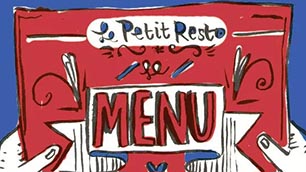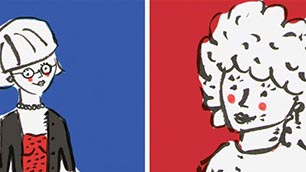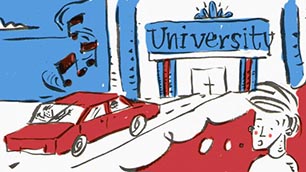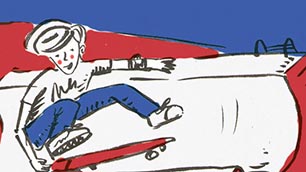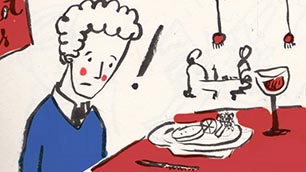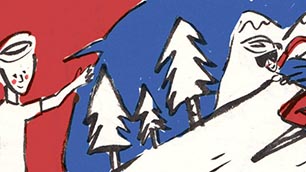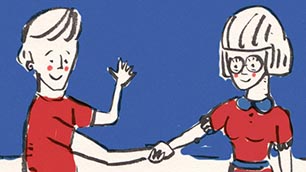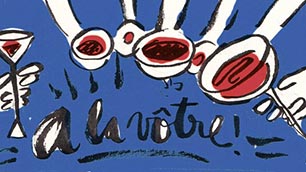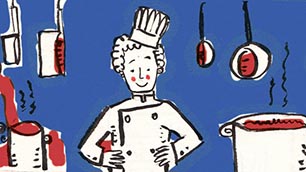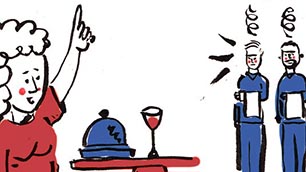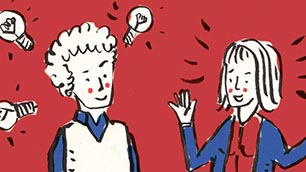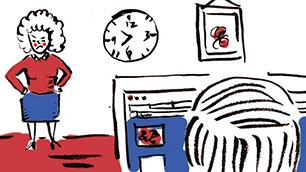Avoir in the present
| Valérie: | Let's learn about le verbe avoir - to have. Avoir is as important as le verbe être. Like être, it is a verb and an auxiliary or helping verb. And like être again, it is irregular. It changes at every person. It is also useful to form many idiomatic expressions that we will talk about in our second part of the grammar lesson. We'll need a good knowledge of all personal pronouns, though. |
| Jack: | No problem! Here they are: je, tu, il, elle - these are the singular ones. Then nous, vous, ils, elles - these are the plural ones. |
| Valérie: | Parfait ! So we’ll use them for avoir now. Vous êtes prêt ? |
| Jack: | Oui ! |
| Valérie: | Here is avoir au présent : j’ai tu as il/elle a nous avons vous avez ils/elles ont |
| Jack: | It’s very irregular! |
| Valérie: | I told you! Now it's your turn, Jacques. And please tell me more about your restaurant! ...in French as much as you can, of course. |
| Jack: | Hmmm... |
| Valérie: | J’ai... |
| Jack: | J’ai... un problème. |
| Valérie: | Vous avez un problème, c’est bien. |
| Jack: | C’est bien ? |
| Valérie: | The sentence is good, not the fact that you have a problem. |
| Jack: | Oh, ok. |
| Valérie: | Continue, j’ai un problème, tu as... |
| Jack: | Vous avez the solution. |
| Valérie: | J’ai la solution, ah bon ? |
| Jack: | Non, it’s just a sentence. J’ai la solution. Vous avez la solution. |
| Valérie: | So nous avons la solution. Il a... |
| Jack: | Il a a meeting. |
| Valérie: | Il a une réunion. |
| Jack: | Il a une réunion avec les investisseurs. |
| Valérie: | Il a peur ? It’s one of the idiomatic expressions you can form with avoir. Literally it translates “he has fear” so it means “he is scared”. Il a peur ? |
| Jack: | Oui, il a peur. That’s a bit strong maybe, let’s say il a un peu peur. |
| Valérie: | Good! Let’s recap. |
| Jack: | J’ai un problème, tu as la solution, il a une réunion avec les investisseurs, il a un peu peur. |
| Valérie: | Elle... |
| Jack: | Elle a good ideas for the réunion avec les investisseurs. |
| Valérie: | Elle a des bonnes idées. Try “we have”, “you have”, “they have” now. |
| Jack: | Nous avons a leçon de français before the réunion avec les investisseurs, vous avez, vous avez... |
| Valérie: | Vous avez besoin de respirer. It means you have need of breathing or you need to breathe... if you’re nervous. Vous avez besoin de respirer si vous êtes nerveux. |
| Jack: | Oui, j’ai besoin de respirer because je suis nerveux. |
| Valérie: | Inspirer, expirer, inspirer, expirer Jacques. |
| Jack: | Breathe in, breathe out. Inspirer, expirer. |
| Valérie: | Ok, vous avez besoin de respirer, ils ont... |
| Jack: | Ils ont des questions, lots of questions, les investisseurs. |
| Valérie: | Beaucoup de questions. |
| Jack: | Les investisseurs ont beaucoup de questions. |
| Valérie: | Ils ont des doutes ? Do they have doubts? |
| Jack: | Ils ont des doutes about mon restaurant. |
| Valérie: | Et vous, vous avez des doutes ? |
| Jack: | Non, j’ai confidence. |
| Valérie: | Vous avez confiance dans votre idée. |
| Jack: | Oui, j’ai confiance dans votre idée. |
| Valérie: | Non, dans mon idée. |
| jack: | J’ai confiance dans mon idée. |
| Valérie: | Vous avez le pouvoir. |
| Jack: | J’ai le pouvoir. |
| Valérie: | Parfait ! It seems you’re good to go with le verbe avoir and with la réunion avec les investisseurs. |
| Jack: | Merci Valérie ! |
| Valérie: | We’ll practice more avoir and idiomatic expressions in our second part of the grammar lesson. |




